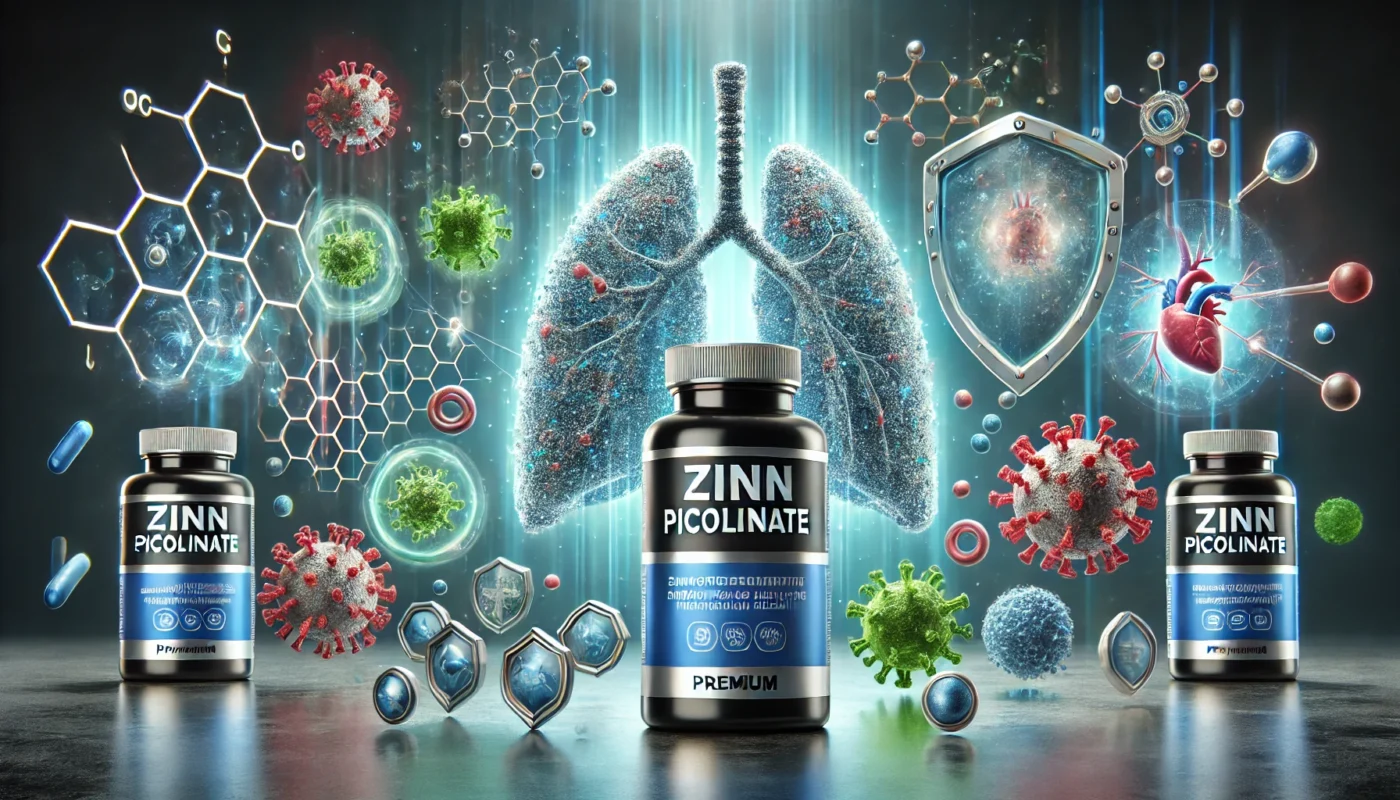Respiratory infections are among the most common illnesses worldwide, ranging from the common cold to more serious conditions like pneumonia or bronchitis. These infections can have a significant impact on quality of life and, in severe cases, lead to hospitalization or long-term complications. Strengthening the immune system is a key strategy in combating respiratory illnesses, and zinc, an essential trace mineral, plays a pivotal role in this effort.
Zinc picolinate, a highly bioavailable form of zinc, offers enhanced absorption and efficiency, making it an excellent choice for individuals looking to support respiratory health. This article explores the mechanisms by which zinc picolinate enhances immune function, shortens the duration of respiratory infections, and supports overall respiratory wellness.
You May Also Like:
Zinc Picolinate for Seniors: Maintaining Immune Vitality
Zinc Picolinate for Healthy Aging in the Immune System: What You Need to Know
Zinc Picolinate for Respiratory Health: Fighting Common Infections is an original (HSLHealing) article.
Understanding the Role of Zinc in Respiratory Health
Zinc is a critical mineral involved in numerous biological functions, particularly in immune defense. It supports the body’s ability to fight infections by:
- Enhancing Immune Function:
Zinc is essential for the development and activation of T-cells, which are crucial in identifying and eliminating pathogens. - Reducing Inflammation:
Zinc modulates the production of pro-inflammatory cytokines, which, when elevated, can damage lung tissues during infections. - Maintaining Mucosal Barriers:
Zinc supports the structural integrity of respiratory epithelial cells, forming a protective barrier against pathogens. - Promoting Antiviral and Antibacterial Activity:
Zinc has direct antiviral effects, including inhibiting the replication of viruses like rhinoviruses, which cause the common cold.

What Is Zinc Picolinate?
Zinc picolinate is a chelated form of zinc, where zinc is bound to picolinic acid. This form is highly absorbable, ensuring that more zinc is available to the body for immune and respiratory support compared to other forms like zinc sulfate or zinc oxide.
How Zinc Picolinate Bolsters Respiratory Health
1. Enhancing Immune Cell Function
Zinc is essential for the activation of white blood cells, particularly T-cells and natural killer (NK) cells, which play a critical role in identifying and eliminating pathogens.
- Study Insight: A study in American Journal of Clinical Nutrition found that zinc supplementation improved T-cell function in zinc-deficient individuals, leading to enhanced immune responses during respiratory infections.
2. Shortening the Duration of Colds
Zinc inhibits viral replication in the upper respiratory tract, reducing the severity and duration of common colds caused by rhinoviruses.
- Clinical Evidence: A meta-analysis in The Cochrane Database of Systematic Reviews concluded that zinc supplementation reduced the duration of cold symptoms by an average of 33% when taken within 24 hours of symptom onset.
3. Protecting Respiratory Mucosa
Zinc strengthens the epithelial barriers in the respiratory tract, preventing pathogens from entering and establishing infections.
- Research Insight: A study published in Respiratory Medicine showed that zinc supplementation reduced the incidence of secondary bacterial infections in patients with viral respiratory illnesses.
4. Reducing Inflammatory Damage
During infections, excessive inflammation can worsen symptoms and damage lung tissues. Zinc picolinate reduces the production of pro-inflammatory cytokines like interleukin-6 (IL-6) and tumor necrosis factor-alpha (TNF-α).
- Study Finding: Research in Nutrients demonstrated that zinc supplementation lowered inflammatory markers in patients with respiratory illnesses, leading to faster recovery and reduced lung damage.
5. Providing Antiviral Effects
Zinc disrupts viral replication by interfering with enzymes that viruses use to multiply, making it particularly effective against respiratory viruses.
- Evidence: A study in PLOS Pathogens found that zinc ions inhibited the replication of coronaviruses, including SARS-CoV-2, in vitro.

The Importance of Zinc for Vulnerable Populations
Certain groups are more susceptible to zinc deficiency, which can impair respiratory health and increase the risk of infections:
- Elderly Individuals:
Age-related decline in zinc absorption and immune function makes older adults more vulnerable to respiratory infections. - People with Chronic Conditions:
Chronic illnesses like diabetes, asthma, and COPD are associated with increased zinc requirements. - Vegans and Vegetarians:
Plant-based diets may provide less bioavailable zinc, increasing the risk of deficiency.
Statistics:
- A study in Journal of Nutrition reported that 17% of the global population is at risk of zinc deficiency, with higher prevalence in the elderly and individuals with chronic illnesses.
- Research in Clinical Nutrition found that zinc-deficient individuals were 40% more likely to develop severe respiratory infections compared to those with adequate zinc levels.
Zinc-Rich Foods for Respiratory Health
While zinc picolinate supplementation is highly effective, including zinc-rich foods in your diet can further support respiratory health:
- Animal-Based Sources: Oysters, beef, chicken, eggs, and dairy products.
- Plant-Based Sources: Lentils, chickpeas, pumpkin seeds, quinoa, and fortified cereals.
For individuals with dietary restrictions or higher zinc needs, zinc picolinate supplements provide a reliable alternative.
Recommended Dosage and Safety
Dosage Guidelines
- Adults: 15–30 mg/day
- For Respiratory Health Support: Up to 40 mg/day (consult with a healthcare provider)
Safety Considerations
Excessive zinc intake (above 40 mg/day) can cause:
- Nausea
- Diarrhea
- Reduced copper absorption
Tip: Take zinc picolinate with food to minimize the risk of gastrointestinal discomfort.

Clinical Studies Supporting Zinc for Respiratory Health
- Zinc and Common Cold Duration (2013):
A meta-analysis in Cochrane Database of Systematic Reviews found that zinc supplementation reduced the duration of cold symptoms by up to 33%, especially when taken within the first 24 hours of symptom onset. - Zinc and Viral Replication (2015):
Research in PLOS Pathogens demonstrated that zinc disrupted viral replication in respiratory viruses, including rhinoviruses and coronaviruses. - Zinc and Immune Function in the Elderly (2017):
A study in American Journal of Clinical Nutrition found that zinc supplementation improved immune responses and reduced the frequency of respiratory infections in older adults. - Zinc and Respiratory Inflammation (2018):
A clinical trial in Respiratory Medicine showed that zinc supplementation reduced inflammation and improved recovery times in patients with bronchitis. - Zinc and COVID-19 (2020):
Emerging research published in Frontiers in Immunology highlighted the potential role of zinc in mitigating respiratory inflammation and reducing the severity of COVID-19 symptoms.
How to Incorporate Zinc Picolinate into Your Routine
- Take at the First Sign of Symptoms: Zinc picolinate is most effective when taken at the onset of cold or respiratory symptoms.
- Combine with Vitamin C: Vitamin C enhances zinc absorption and provides additional immune support.
- Follow a Balanced Diet: Supplementation should complement a diet rich in nutrients that support respiratory health.
- Monitor Progress: Track symptom improvement and consult with a healthcare provider for personalized guidance.
Future Research Directions
While current evidence supports the role of zinc picolinate in respiratory health, further studies are needed to explore:
- Long-term effects of zinc supplementation on chronic respiratory conditions like asthma or COPD.
- Synergistic effects of zinc with other immune-supportive nutrients.
- Zinc’s role in preventing respiratory infections in high-risk populations.
Conclusion: Zinc Picolinate for Respiratory Health
Zinc picolinate offers a scientifically supported, natural approach to bolstering respiratory health and managing infections. By enhancing immune function, reducing inflammation, and inhibiting viral replication, zinc picolinate addresses key factors in respiratory illness prevention and recovery.
For individuals seeking to strengthen their defenses against respiratory infections, incorporating zinc picolinate into a daily wellness routine can provide significant benefits. As always, consult with a healthcare provider to tailor supplementation to your specific needs and ensure safe and effective use.

References
- Zinc and immune function: the biological basis of altered resistance to infection. Retrieved from: https://www.sciencedirect.com/science/article/pii/S0002916523006251
- Zinc in Human Health: Effect of Zinc on Immune Cells. Retrieved from: https://pmc.ncbi.nlm.nih.gov/articles/PMC2277319/
- Zinc Supplementation Reduces Common Cold Duration among Healthy Adults: A Systematic Review of Randomized Controlled Trials with Micronutrients Supplementation. Retrieved from: https://pmc.ncbi.nlm.nih.gov/articles/PMC7356429/
- Zn2+ Inhibits Coronavirus and Arterivirus RNA Polymerase Activity In Vitro and Zinc Ionophores Block the Replication of These Viruses in Cell Culture. Retrieved from: https://pmc.ncbi.nlm.nih.gov/articles/PMC2973827/
Important Note: The information contained in this article is for general informational purposes only, and should not be construed as health or medical advice, nor is it intended to diagnose, prevent, treat, or cure any disease or health condition. Before embarking on any diet, fitness regimen, or program of nutritional supplementation, it is advisable to consult your healthcare professional in order to determine its safety and probable efficacy in terms of your individual state of health.
Regarding Nutritional Supplements Or Other Non-Prescription Health Products: If any nutritional supplements or other non-prescription health products are mentioned in the foregoing article, any claims or statements made about them have not been evaluated by the U.S. Food and Drug Administration, and such nutritional supplements or other health products are not intended to diagnose, treat, cure, or prevent any disease.

